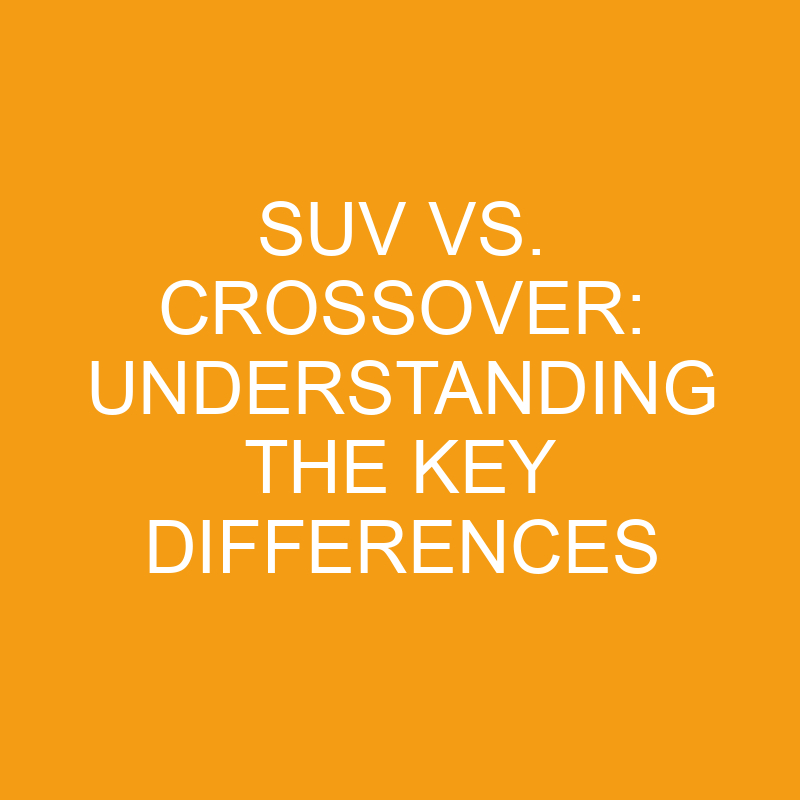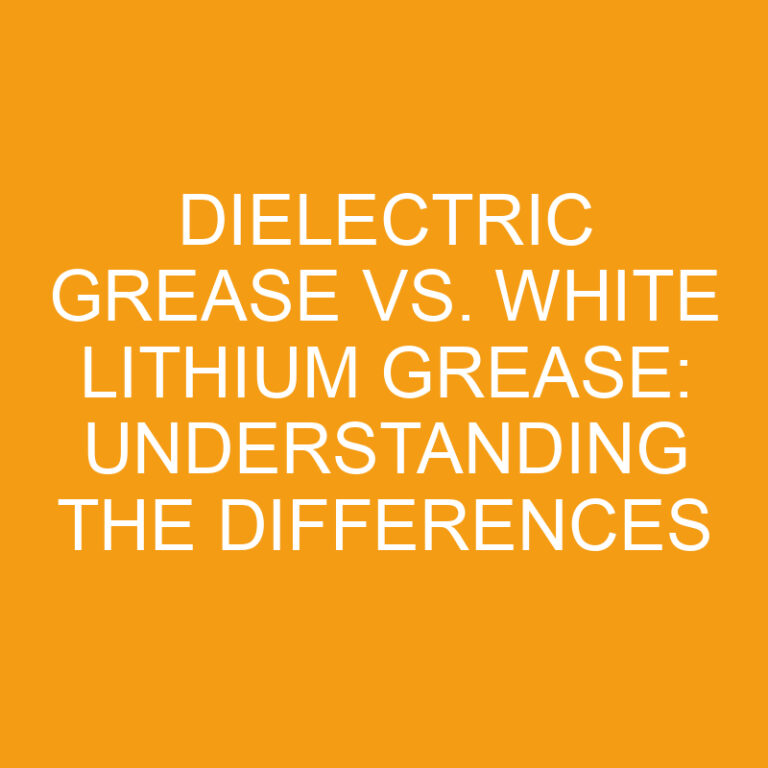
When it comes to choosing a vehicle, the options can be overwhelming. One common dilemma that many car buyers face is understanding the difference between an SUV and a crossover. While these terms are often used interchangeably, there are distinct characteristics that set them apart. As someone who has navigated the car market for years, I can confidently say that understanding the nuances between SUVs and crossovers can make a world of difference in finding the perfect vehicle for your needs.
Picture this: you’re at a dealership, surrounded by rows of shiny vehicles, and you’re torn between an SUV and a crossover. You’re not alone. Many people find themselves in this exact situation, unsure of which option is best suited for their lifestyle. That’s why I’m here to shed some light on this topic. So, buckle up and join me as we dive into the world of SUVs and crossovers, exploring their similarities, differences, and everything in between. Trust me, by the end of this article, you’ll be equipped with the knowledge to make an informed decision and drive away with confidence.
Post Contents
- Key Takeaways
- What is an SUV?
- What is a Crossover?
- Key Similarities between SUVs and Crossovers
- Key Differences between SUVs and Crossovers
- Factors to Consider When Choosing Between an SUV and a Crossover
- Conclusion
- Frequently Asked Questions
- Q: What are the key differences between SUVs and crossovers?
- Q: What factors should be considered when choosing between an SUV and a crossover?
- Q: What are the advantages of SUVs?
- Q: What are the advantages of crossovers?
- Q: Which is more budget-friendly, an SUV or a crossover?
- Q: Are there any downsides to choosing an SUV?
- Q: What should I consider when it comes to performance and handling?
- Q: Can I tow with a crossover?
- Q: Which type of vehicle is better for a larger family?
- Q: Is it possible to find an SUV or crossover within a certain budget?
Key Takeaways
- SUVs are characterized by their tough and robust construction, ample passenger space, and generous cargo capacity. They have a body-on-frame construction, higher ground clearance, and are designed for versatility and off-road capabilities.
- Crossovers blend the characteristics of an SUV with the car-like driving dynamics of a sedan. They have a unibody construction, offer a smoother and more comfortable ride, and provide ample passenger and cargo space. They are practical and versatile options for individuals and families.
- SUVs and crossovers have similarities such as rugged design, spacious interiors, generous cargo space, versatility, safety features, technology and infotainment options, and a comfortable ride.
- Key differences between SUVs and crossovers include construction (body-on-frame vs. unibody), driving dynamics (rough terrains vs. smooth ride), size and versatility (larger vs. more compact), and fuel efficiency (lower vs. higher).
- Factors to consider when choosing between an SUV and a crossover include size and space, performance and capability, fuel efficiency and handling, and budget and pricing. Evaluating these factors will help determine the best fit for individual needs and preferences.
What is an SUV?
When it comes to the world of automobiles, SUV stands for Sport Utility Vehicle. As an enthusiast who has spent many years in the industry, I often come across confusion between SUVs and crossovers. So, let’s dive into what exactly defines an SUV.
An SUV is typically characterized by its tough and robust construction, which allows it to handle various terrains with ease. These vehicles are known for their ample passenger space and generous cargo capacity. One of the defining features of an SUV is its body-on-frame construction, similar to that of a truck. This construction gives it a more rugged and sturdy feel, making it a popular choice for those who require a vehicle capable of towing heavy loads or venturing off-road.
Additionally, SUVs are designed with a higher ground clearance, allowing them to navigate through uneven or rough terrains. This elevated seating position not only provides better visibility but also gives the driver a sense of superiority on the road.
SUVs come in various sizes, ranging from compact models to full-size behemoths. They offer a wide range of options in terms of engine power, interior features, and off-road capability. Some SUVs are even equipped with advanced four-wheel drive systems, enabling them to tackle challenging off-road conditions.
It’s important to mention that SUVs have evolved over time. Nowadays, manufacturers offer crossover SUVs, which blend the desirable characteristics of an SUV with the car-like driving dynamics of a sedan. Crossovers typically have a unibody construction, similar to that of a car, which makes them lighter and more fuel-efficient compared to traditional SUVs.
To summarize, SUVs are robust vehicles designed for versatility and off-road capabilities. Their construction, spaciousness, and ability to conquer rough terrains set them apart from other vehicle types. Whether you’re tackling the great outdoors or simply looking for a vehicle with ample space and a commanding view of the road, an SUV might just be the perfect fit for you.
What is a Crossover?
To truly understand the difference between an SUV and a crossover, it’s essential to know what exactly a crossover is. In simple terms, a crossover is a type of vehicle that blends the characteristics of an SUV with the car-like driving dynamics of a sedan.
Unibody Construction: One of the key features that sets crossovers apart from traditional SUVs is their unibody construction. Unlike SUVs, which typically have a body-on-frame construction, crossovers are built using a single structure that combines the body and frame. This design choice makes crossovers lighter, more fuel-efficient, and easier to handle on the road.
Car-like Performance: Crossovers are designed to provide a smooth and comfortable driving experience, similar to that of a sedan. They often have lower ground clearance than SUVs, which means they are not intended for serious off-road adventures. However, most crossovers do offer enough capability to handle light off-road conditions or rough terrain.
Spaciousness and Versatility: Despite their more car-like driving characteristics, crossovers still provide ample passenger space and cargo capacity. They usually offer a roomy interior, with options for folding rear seats to create extra cargo space when needed. This makes crossovers a practical choice for families or individuals who require versatility in their vehicle.
Wide Range of Options: Just like SUVs, crossovers come in various sizes and offer a wide range of options in terms of engine power, interior features, and technology. Whether you’re looking for a compact crossover for urban driving or a larger one for long trips, there’s likely a crossover available that suits your needs and preferences.
Crossovers bridge the gap between SUVs and sedans, offering a blend of the best features from both worlds. With their unibody construction, car-like driving dynamics, and spaciousness, crossovers provide a practical and versatile option for individuals and families who seek a comfortable and capable vehicle without the ruggedness of a traditional SUV.
Key Similarities between SUVs and Crossovers
When it comes to SUVs and crossovers, there are several key similarities that make them popular choices among consumers. While they may have their own unique characteristics, there are common features that both types of vehicles share. Here are some important similarities to consider:
- Design and Styling: Both SUVs and crossovers have a rugged and sporty appearance that sets them apart from traditional sedans. They often feature a bold grille, muscular body lines, and larger wheels, giving them a commanding presence on the road.
- Passenger Capacity: One of the main reasons people opt for SUVs and crossovers is their ability to accommodate more passengers compared to sedans. These vehicles typically have a spacious interior with seating for five to seven people, making them a practical choice for families or those who frequently travel with a group.
- Cargo Space: Whether you’re going on a road trip or simply need to transport larger items, both SUVs and crossovers offer generous cargo capacity. With foldable rear seats and versatile storage configurations, these vehicles provide ample space for luggage, groceries, or outdoor gear.
- Versatility: SUVs and crossovers are designed with versatility in mind. They are equipped with features like roof racks, towing capabilities, and optional all-wheel drive systems, allowing them to handle various outdoor activities or road conditions.
- Safety Features: As modern vehicles, SUVs and crossovers prioritize safety. They come equipped with advanced safety features such as stability control, multiple airbags, rearview cameras, and collision avoidance systems to ensure the well-being of occupants.
- Technology and Infotainment: Modern SUVs and crossovers offer a wide range of technological conveniences and entertainment options. From touchscreen infotainment systems to smartphone integration and advanced driver assistance systems, these vehicles keep pace with the latest technologies.
- Comfort and Ride Quality: Both SUVs and crossovers prioritize a comfortable ride. They feature plush interiors, supportive seating, and advanced suspension systems that provide a smooth and enjoyable driving experience for both short commutes and long journeys.
Key Differences between SUVs and Crossovers
When it comes to choosing between an SUV and a crossover, it’s important to understand the key differences between the two. While they may seem similar at first glance, there are a few distinct features that set them apart. Let’s delve into the key differences between SUVs and crossovers:
1. Construction: One of the main differences between SUVs and crossovers lies in their construction. SUVs have a body-on-frame construction, which means that the body of the vehicle is mounted on a separate frame. This construction gives SUVs a more rugged and durable build, making them capable of handling off-road conditions with ease. On the other hand, crossovers have a unibody construction, where the body and frame are integrated. This construction makes crossovers lighter and more fuel-efficient, while sacrificing some of the off-road capabilities of SUVs.
2. Driving Dynamics: Another noticeable difference between SUVs and crossovers is their driving dynamics. SUVs have a higher ground clearance and are designed to handle rough terrains and off-road adventures. They offer a more truck-like driving experience, with a sturdy and powerful feel on the road. On the contrary, crossovers are designed to provide a more car-like driving experience. They have a lower ground clearance, which results in a smoother and more comfortable ride on paved roads. Crossovers prioritize a smooth and nimble driving experience.
3. Size and Versatility: SUVs are generally larger and offer more passenger and cargo space compared to crossovers. They often come with three rows of seating, allowing them to accommodate larger families or groups of passengers. Additionally, SUVs usually have more towing capacity, making them a great option for those who need to tow trailers or boats. Crossovers, on the other hand, are more compact in size and are ideal for individuals or smaller families who prioritize fuel efficiency and maneuverability.
4. Fuel Efficiency: Due to their lighter construction and more car-like driving dynamics, crossovers tend to offer better fuel efficiency compared to SUVs. This is an important factor to consider for those who do a lot of city driving or have long commutes. If fuel efficiency is a top priority for you, a crossover might be a more suitable choice.
Factors to Consider When Choosing Between an SUV and a Crossover
When deciding between an SUV and a crossover, there are several key factors to take into consideration. By carefully evaluating these factors, you can determine which type of vehicle best suits your needs and preferences.
1. Size and Space
One of the main differences between an SUV and a crossover is the size and space they offer. SUVs are generally larger and provide ample passenger and cargo capacity. If you have a large family or frequently need to transport a lot of gear, an SUV might be the better choice for you. On the other hand, crossovers are more compact and can be easier to maneuver in tight spaces or crowded city streets.
2. Performance and Capability
Another important factor to consider is the performance and capability of the vehicle. SUVs, with their body-on-frame construction and higher ground clearance, are designed for off-road adventures and can handle rough terrains with ease. If you enjoy outdoor activities or need a vehicle that can handle challenging road conditions, an SUV is a great option. Crossovers, on the other hand, prioritize fuel efficiency and offer a smoother and more comfortable ride.
3. Fuel Efficiency and Handling
Speaking of fuel efficiency, crossovers are generally more fuel-efficient compared to SUVs. This is because crossovers are built on a unibody construction, making them lighter and more aerodynamic. If you do a lot of city driving or have a long commute, a crossover can save you money on fuel costs. Additionally, crossovers often have better handling and are more car-like to drive, offering a smoother and more responsive ride.
4. Budget and Pricing
Of course, your budget is an essential consideration when choosing between an SUV and a crossover. SUVs tend to be more expensive than crossovers due to their larger size and capabilities. Crossovers, on the other hand, are often more affordable and offer a great balance between price and functionality. By setting a budget and determining what features are most important to you, you can make a decision that fits within your financial means.
Conclusion
Choosing between an SUV and a crossover can be a decision that greatly impacts your driving experience. Understanding the key differences between these two types of vehicles is crucial in making the right choice.
SUVs offer larger size and more passenger and cargo space, making them ideal for families or individuals who require ample room. On the other hand, crossovers are more compact and fuel-efficient, making them a suitable option for those who prioritize efficiency and maneuverability.
When deciding between an SUV and a crossover, it’s important to consider factors such as size and space, performance and capability, fuel efficiency and handling, as well as budget and pricing. Evaluating these aspects will help you determine which vehicle best suits your needs and preferences.
Ultimately, the choice between an SUV and a crossover comes down to your individual requirements and priorities. By carefully considering these factors, you can confidently select the vehicle that will enhance your driving experience and meet your specific needs.
Frequently Asked Questions
Q: What are the key differences between SUVs and crossovers?
A: SUVs are larger and offer more passenger and cargo space, while crossovers are more compact and fuel-efficient.
Q: What factors should be considered when choosing between an SUV and a crossover?
A: Factors to consider include size and space, performance and capability, fuel efficiency and handling, and budget and pricing.
Q: What are the advantages of SUVs?
A: SUVs provide ample passenger and cargo space, as well as the capability to handle off-road conditions.
Q: What are the advantages of crossovers?
A: Crossovers are more fuel-efficient and easier to maneuver in city traffic compared to SUVs.
Q: Which is more budget-friendly, an SUV or a crossover?
A: Generally, crossovers are more budget-friendly due to their lower starting prices and better fuel economy.
Q: Are there any downsides to choosing an SUV?
A: SUVs tend to have higher fuel consumption and are more difficult to park and navigate in tight spaces.
Q: What should I consider when it comes to performance and handling?
A: SUVs offer more power and better off-road capability, while crossovers excel in maneuverability and handling in city environments.
Q: Can I tow with a crossover?
A: While some crossovers have towing capabilities, their towing capacity is generally lower compared to SUVs.
Q: Which type of vehicle is better for a larger family?
A: SUVs are generally the better choice for larger families due to their spaciousness and ability to accommodate more passengers.
Q: Is it possible to find an SUV or crossover within a certain budget?
A: Yes, SUVs and crossovers are available in various price ranges, allowing individuals to find a vehicle that fits their budget.






